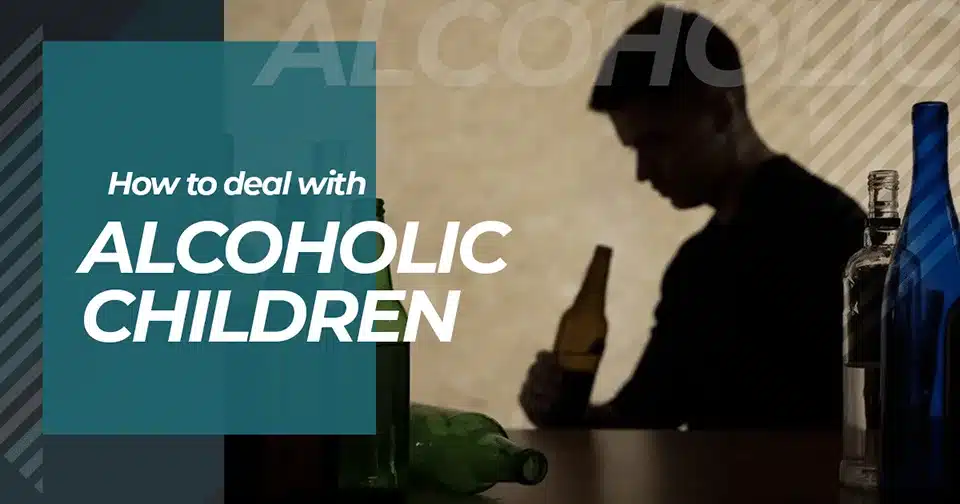Alcohol addiction is something that not only affects the addicted but also affects everyone around them. If you have alcoholic children, it can be easy to lose your temper and go make the situation worse. It is crucial to know that sharing feelings of anger, disappointment, hurt, and showing negative emotions towards them may further worsen their addiction.
Showing love and positive regard towards helping them recover and heal through their addiction no matter how long of a process it may seem like will get you the best results. Remember, patience is key.
Alcoholic Children
One in every 12 children suffers from drug addiction. Alcohol addictions mostly come from broken families or families where there is already an adult consuming that drug more than a moderate balance.
When you see one of your children going through this tough phase, all you need to do is show unrelenting support and love, but sometimes that love can also be harmful to them, so it’s crucial to maintain a healthy balance.
Addiction may make a person feel lonely, and those around them, feelings of tension and anxiety surrounding one’s own life may be more intense through representations of peaceful home lives. Addiction has a way of making people feel like they are the only people who experience it, when in fact, countless people go through similar circumstances every day.
Feelings of anxiety about your children’s drinking problem are common, and it is normal to be afraid of what the future might bring. You might ask yourself, “How am I supposed to support my alcoholic son?” or “How can I offer my alcoholic daughter some help?” Or maybe, you’re not even 100% positive that your child is dealing with alcohol abuse.
Taking Care of your Own Mental Health
While this mix of emotions is entirely common, it is essential not to let worry take over your life. In a positive, safe way, there are ways to fix these issues.
When dealing with children that suffer from addiction of any type, be it drug or alcohol. You must understand how to deal properly with them. First and foremost, you should understand that you should get yourself together and take care of yourself first. You cannot provide a good example for your children if you are panicked and scattered yourself. To make a good front, you need to make yourself be the adult you are. You must keep yourself together and settled, which involves taking care of yourself, eating well, resting well, and looking as healthy as you can.
Alcoholic families have to look out for each other. While you will spend a lot of time and energy trying to help your child overcome alcoholism, it is important not to lose sight of other family members affected by it. Protecting members of your family from the possible effects of your child’s addiction is critical. Alcoholism can cause physical or emotional trauma for loved ones, making it essential to protect your family’s needs.
What is Alcohol Addiction?
Alcohol addiction is when you or someone you love consumes alcohol way too much, and now either their life or life is affected by it for the worst.
If you are still wondering about the exact amount of alcohol consumption it takes to be considered an alcoholic, or what counts as excessive, it may be less than you might be thinking.
According to the National Institute on Drug Abuse, In the United States, one “standard” drink (or one alcoholic drink equivalent) contains roughly 14 grams of pure alcohol, which is found in 12 ounces of regular beer, which is usually about 5% alcohol. 5 ounces of wine, which is typically about 12% alcohol. 1.5 ounces of distilled spirits, which is about 40% alcohol

For men, excess alcohol consumption is defined as 15 or more 15 drinks a week. For women, eight or more drinks per week are considered excessive.
According to the National Institute of Health (NIH) statistics of 2015, 15.1 million American adults, which makes about 6.2 percent of the population, were alcoholics. World Health Organization (WHO) statistics show that globally, there are 3.3 million deaths every year due to alcohol addiction.
Another thing is that you should understand that you are not alone. You can get help from treatment centers. You can get professional help. You can look for support groups and motivational groups to get as much information as you can to help your son get all the possible options and opinions about how to do things. Get all your perspectives clear.
Choose the Correct Drug and Alcohol Rehab
There are so many recovery facilities open that choosing the right one can be daunting and challenging. When searching for a treatment facility, consider the circumstances and unique needs of your child. This can include variables such as:
Age-specific Treatment
In the development of addiction and what will need to be discussed in care, age may play a significant role. Choosing a treatment program specific to you will help your child excel in the long term.
Long-term Treatment
Studies indicate that long-term treatment is more effective than short-term or outpatient treatment services, especially for young adults.
Gender-Specific Therapy
Biological variations are innate, allowing substance addiction to have varying effects on men and women. In mixed-gender groups, exploring these subjects and other similar experiences can be difficult.
Dual Diagnosis
Those who deal with addiction often struggle with a co-occurring mental health problem. As a means of escape and self-medication, alcohol is sometimes used, which can worsen these conditions. Around the same time, a dual-diagnosis treatment facility helps treat both opioid addiction and mental health conditions such as depression or anxiety, presenting your child with the most remarkable improvement of progress.
What Level of Care or Services do they Need?
There are many different treatment options to decide from when trying to help someone stop drinking. One thing to consider is withdrawal or dependency. Those who have been drinking regularly for an extended period of time, will have developed a physical dependence on alcohol. Withdrawal symptoms can be fatal, and a medically assisted detox is required to treat alcohol dependence. Not all treatment facilities offer detox services, so it’s important to determine if that’s the need when doing your initial research.

Support Groups
There are many support groups available to help you deal with alcoholic children. Of course, there are support groups for the alcoholic, like (12 steps, or AA), but it’s also good to know there are support groups for the family of the alcoholic too.
Al-anon is a group specifically for people who have been affected by loved ones battling alcoholism. Check here to find al-anon meetings near you. This will provide you support, knowledge, and tips to help be prosperous through dealing with alcoholic children, or family.
If you’re looking for a detox program for your alcoholic children, and want them to take the first steps to sobriety… contact Opus Health today to help your loved ones get the proper treatment they deserve. Call Now! (949) 617-0905




